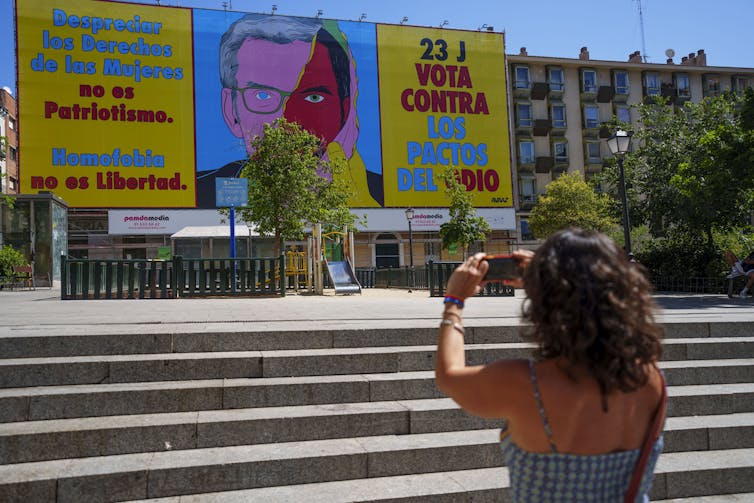
Spanish voters are headed to the polls on July 23, in the midst of the summer holiday period.
Two questions will keep analysts busy until well after the election. First, will it be possible to form a government supported by a stable majority in parliament? And second, will the government include elected officials from Vox, a far-right party hostile to immigration, as well as the rights of women and sexual and gender minorities?
If the conservatives of the Partido Popular (PP) win and Vox holds the balance of power, the far right will join a governing coalition for the first time since the consolidation of Spanish democracy.
As a doctoral student and lecturer in sociology at the Université du Québec à Montréal, my research focuses on the collective memory of the fascist past in democratic Spain and Italy.
From regional and municipal elections to general elections
The parties in the Spanish governing coalition suffered a historic defeat in the May 28 regional and municipal elections.
The PP should soon lead 11 regions, against three for the socialists. Before the regional elections, these two parties led five and nine regions, respectively. The PP is also expected to govern in coalition with Vox in 135 municipalities.
The PP’s progress has been marked: Nationally, the party gained nearly two million votes compared to the November 2019 general election, peaking at 31.5 per cent of the vote. The socialists (PSOE) suffered a modest decline of 430,000 votes compared to 2019, receiving 28 per cent of the vote. Still, the collapse of Podemos, their coalition partner, puts the left in a precarious position.

The PP, for its part, absorbed Ciudadanos, a right-wing party whose centrist turn was obviously a failure and who gave up running in the general elections. Vox, for its part, has made significant progress compared to previous regional and municipal elections, and holds the balance of power in five regions won by the PP.
Thus, Vox continues its momentum, driven by the tensions that the plurinational nature of Spain (Catalonia, Basque Country) entails, and by the reluctance of the most conservative component of the Catholic electorate to develop the rights of women and LGBTQ+ people. It follows the example of other far-right political forces that have gained power in Europe in recent years. The party hopes to see a similar progression to Giorgia Meloni’s Fratelli d'Italia and Matteo Salvini’s Lega, which took power in Italy last October. The party dreams of emulating its ally, Viktor Orban, who has ruled Hungary since 2010.
Alberto Núñez Feijóo, leader of the PP, had carefully avoided the question of alliances between his party and Vox until recently, attributing solely a regional level of coalition between these parties. He has been confronted by this question on a daily basis since the general election was called.
Democracy against the far right?
The outgoing prime minister, Pedro Sánchez, is used to risky endeavours. In 2019, he called early elections in November, after being elected a minority during the April election. Lacking the desired gains, he then formed a coalition with Podemos.
In the aftermath of the May 28 elections, he called a general election, invoking the clear message sent by the population, to the end of Spain’s term of office as rotating president of the Council of the European Union.
In strategic terms, Sánchez’s decision is a risky venture. He hopes to dampen the conservative momentum in the hope that the PP and Vox will run out of a majority. In the May 28 elections, the PP and Vox won 38.68 per cent of the vote, which, in the general election, would result in 160 seats, far from the 176 needed for a parliamentary majority. The long-term trend is to erode the socialist vote and increase the number of votes in favour of the PP: A vote in July rather than in December could leave the right with too little time and cost it the majority.
The left bets on unity
Socialists are calling for a stand-off against the far right. The election campaign coincides with negotiations on the formation of coalitions to govern the autonomous regions. The PP has already agreed with Vox to form coalitions in Valencia and Extremadura. The conservatives negotiated the abstention of the far right in the Balearic Islands in exchange for the presidency of parliament, but without conceding a ministerial portfolio to Vox. The PSOE relies on these alliances to mobilize its electorate.
In order to better deal with the threat posed by the far right, the left is committed to unity. Political forces to the left of the PSOE rallied in a new party, Sumar, led by outgoing Labour Minister Yolanda Díaz. This will avoid the division of the vote that cost Podemos dearly on May 28.

In the campaign, the PSOE and Sumar agree on the options available to voters: a left-wing bloc, heir to a progressive government; and a right-wing and far-right bloc, which wants to dismantle the social policies put in place by the left.
The right hesitates, then assumes its alliances
To counter the socialist call to block the far right, Feijóo’s PP adjusted its strategy. He first called on Vox to let his party govern the regions where he came out on top without making concessions to the far right.
He also called on Sánchez and his party’s elected representatives to pledge to abstain during the inauguration of the future Spanish government, if this is necessary to allow the winning party to govern alone. The socialist leader refused to commit to this, recalling the opposition of the PP to the inauguration of the socialists following the two general elections of 2019.
The right wanted to capitalize on the momentum given to it in the May 28 elections by avoiding giving ammunition to the socialists with too close an alliance with Vox. The PP is now transparent about its readiness to bring Vox into the central government if the support of its members of parliament is needed for its inauguration.
The right has few allies
This change of course reflects a persistent problem for the PP: in a fragmented party system, the right has few potential allies in parliament, deeming alliances with the Basque and Catalan nationalist parties illegitimate.
To those who ask him about the risks of a coalition with Vox, Feijóo passes the ball back to Sánchez with what many see as a false equivalence. The socialist leader, at the head of a coalition with the left-wing populists of Podemos, sometimes needed the support of the Basque and Catalan separatists during the last legislature, but he did not allow them to govern.
Voter turnout, a key element for socialists
While Sánchez calls for curbing the rise of the far right, Feijóo wants to frame the July 23 election as a referendum on the Sánchez years.
Voter turnout will be a key element of socialist success, but elections held in the summer tend to demobilize the electorate, which risks benefiting the right.

In this context, Sánchez wants to force his opponent to debate, while Feijóo is happy with a weak engagement of the electorate. He accepted only a face-to-face debate with Sanchez, while the latter takes advantage of all the invitations on the television sets to try to convince the public to grant him another mandate.
Calculated risk?
Sánchez plays big in these elections: his failure would bring the far right to power for the first time in 45 years of democracy. This would be an indelible stain on his political career.
For now, polls show the PP winning, but a coalition with Vox may not be enough to give it a majority. Under the circumstances, Sánchez clings to the hope of staying in power despite the expected victory of the PP. If he gets the chance, he’ll certainly face an uphill battle in negotiating the support of the many parties he’ll need for his inauguration.
Michel-Philippe Robitaille received funding from the Fonds de recherche du Québec - Société et culture and the Canada Research Chair in the Sociology of Social Conflict.
This article was originally published on The Conversation. Read the original article.







